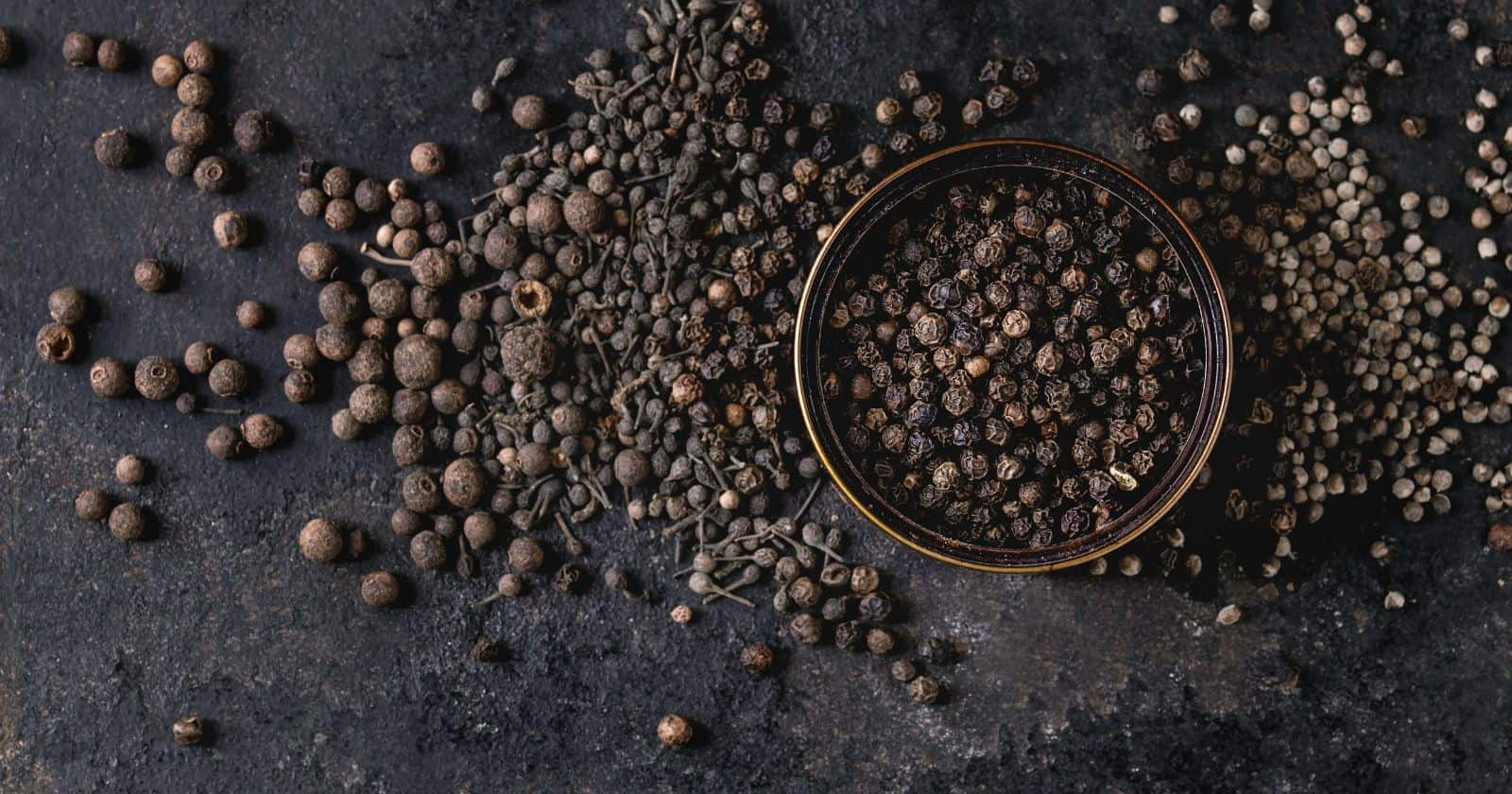As cat owners, we know our furry friends are curious explorers that sometimes get into things they shouldn’t. This often has us wondering – can cats eat black pepper? Is this common household
The short answer is yes, cats can eat small amounts of black pepper occasionally. But it does not provide any health benefits. And too much can cause side effects like digestive upset.
Black pepper contains a compound called piperine that gives it that signature spicy kick. For cats, piperine is an irritant that can stimulate their digestive tract. So gobbling down lots of black pepper can leave cats with tummy troubles.
Consuming tiny pinches of this
In this article, we’ll explore whether black pepper is toxic for cats, signs of pepper toxicity, and safer seasonings to use instead. We want to give cat parents the insights they need to make informed decisions about black pepper safety.
Let’s dive in and discover everything there is to know about cats and black pepper!
Is Black Pepper Safe for Cats?
The first question many cat parents have is, “Can cats eat black pepper?” The short answer is yes, cats can eat small amounts of black pepper safely.
Black pepper is not toxic or poisonous to cats when ingested in tiny quantities. However, that doesn’t mean it provides any health benefits either. This common table
Black Pepper Contains Piperine
The primary compound that gives black pepper its potent taste and aroma is called piperine. Piperine is what puts the “pep” in peppercorns!
This natural organic compound activates our taste receptors, providing that signature spicy pepper kick. For humans, piperine offers some potential health benefits related to digestion and inflammation.
However, for cats, piperine is mostly an irritant. Consuming too much black pepper can overstimulate kitty’s digestive tract and cause discomfort.
So, black pepper is not necessarily harmful in tiny pinches. But that doesn’t mean you should sprinkle it liberally on Fluffy’s dinner either. It’s better to keep use of this
What Are the Risks of Black Pepper for Cats?
While small amounts of black pepper won’t hurt your cat, ingesting larger quantities can cause problems. Here are some potential risks and side effects to be aware of:
Gastrointestinal Issues
The most common adverse reaction to black pepper in cats is gastrointestinal upset. Side effects may include:
- Excessive drooling
- Vomiting
- Diarrhea
- Loss of appetite
- Abdominal pain
The piperine in black pepper can irritate the lining of your cat’s GI tract, causing inflammation. Ingesting too much black pepper essentially overloads your cat’s digestive system.
Respiratory Distress
Another potential risk is respiratory distress. Black pepper’s strong, pungent smell comes from natural oils that can irritate a cat’s sensitive respiratory system.
Inhaling too much black pepper could cause coughing, sneezing, and difficulty breathing in some cats. This reaction is more common in cats with preexisting respiratory issues like asthma.
Dehydration
Frequent vomiting and diarrhea caused by ingesting black pepper can quickly lead to dehydration. This is especially dangerous for kittens and senior cats.
Loss of Appetite
The combination of gastrointestinal and respiratory distress may cause your cat to lose their appetite. This can result in malnutrition if your cat refuses meals over an extended time.
Pain and Discomfort
All of the above side effects will also leave your cat feeling unwell. Ingesting too much black pepper can cause oral pain and overall physical discomfort.
How Much Black Pepper Is Safe for Cats?
Ideally, the safest amount of black pepper for your cat is none at all. Since this common
However, tiny quantities likely won’t cause issues for most cats. We’re talking just a sprinkle here and there. One or two peppercorns that accidentally get mixed into your cat’s food won’t be catastrophic.
As a general guideline, limit black pepper intake to less than 1/8 of a teaspoon per day. Anything beyond that may overstimulate your cat’s digestive system.
Of course, each cat is different based on size, age, and overall health. Kittens, seniors, and cats with sensitivities require extra caution. When in doubt, call your veterinarian for dosage guidance.
And if you suspect your cat ate a significant amount of black pepper, contact your vet right away. Seek immediate medical attention if your cat shows any symptoms of pepper toxicity.
Signs of Black Pepper Toxicity in Cats
If your cat accidentally consumes a large quantity of black pepper, watch for these signs of possible toxicity:
- Difficulty breathing
- Wheezing or coughing
- Excessive drooling or foaming at the mouth
- Frequent vomiting
- Diarrhea containing blood or black peppercorns
- Abdominal pain or bloating
- Loss of appetite
- Lethargy or weakness
- Collapse or inability to stand
Any of these symptoms indicate your cat needs immediate veterinary care. Seek emergency treatment to avoid potentially life-threatening dehydration, electrolyte imbalances, or GI obstruction.
Don’t wait to see if symptoms resolve on their own. Black pepper toxicity can escalate rapidly in cats. Get medical help right away at the first concerning sign.
What to Do if Your Cat Eats Black Pepper
Accidents happen, and curious cats can get into pepper shakers when we aren’t looking. So what should you do if your cat manages to gulp down black pepper? Here are some tips:
- Stay calm – Stress won’t help the situation as you assess your cat’s condition.
- Check for symptoms – Look for signs of distress like vomiting, coughing, or labored breathing. Contact your vet if you see any troubling indications.
- Monitor appetite and litter box – Make note if your cat refuses food or has diarrhea after ingesting pepper. Loss of appetite and tummy troubles are common side effects.
- Call animal poison control – If unsure, you can contact the ASPCA Animal Poison Control Center at 888-426-4435 for guidance on your specific situation.
- Visit your vet – If symptoms concern you in any way, take your cat to the vet immediately. It’s better to be safe and have them examined.
- Avoid inducing vomiting – Don’t attempt to make your cat vomit without talking to your vet first. This may complicate treatment.
- Offer water – Encourage your cat to drink to stay hydrated and flush their system out following ingestion.
Stay alert in the hours following potential black pepper exposure. Get medical attention right away if symptoms arise or you have any reason for concern.
Can Cats Detect Black Pepper through Smell?
The strong scent of black pepper may be off-putting or overwhelming for some cats. After all, cats have 14 to 18 times better senses of smell than humans.
When we add a dash of pepper to our meals, we barely notice its aroma. But for cats, that same tiny amount of black pepper can be potent.
Feline noses have around 200 million scent receptors compared to our 5 to 6 million. All that extra odor-detecting power makes cats extremely sensitive to smells we barely register.
What smells pleasantly pungent to us may smell irritatingly intense to cats. Some may detect black pepper from across the room and instinctively avoid it.
So yes, cats can certainly smell black pepper very well. Their supersniffer ability to detect its strong aroma could discourage cats from eating it in some cases.
Do Cats Like the Taste of Black Pepper?
Whether cats like the flavor of black pepper depends on the individual cat. Some cats may detect and dislike its strong taste right away. The piperine that gives black pepper its heat can be off-putting to cats the way spicy foods deter humans.
Other cats, especially those that are gluttons for human food, may not mind the taste of black pepper initially. The pungent aroma and flavor profile are likely still too strong for most cats to enjoy long-term though. A couple licks of black pepper probably satisfy their curiosity!
On the whole, black pepper is much more stimulating and abrasive for cats compared to humans who seek out this
Healthier Spice Alternatives for Cats
Rather than seasoning your cat’s meals with black pepper, try these healthier feline-approved alternatives instead:
Catnip
Well-known for its intoxicating effects on cats, catnip is a safe herb to add to your cat’s diet. Most cats happily munch on catnip. The plant contains vitamins, minerals, and compounds that ease stress and anxiety. It may offer some digestive and immune system benefits too.
Cat Thyme
Similar to catnip, cat thyme contains vitamins, minerals, and antioxidants. Its minty flavor attracts many cats. Some research indicates cat thyme may help repel fleas too.
Valerian Root
This mild sedative herb can reduce anxiety and relax cats. It may also ease stomach upset by soothing digestive muscles. But use valerian root sparingly, as the sedative effects can be strong in cats. Too much can cause dizziness or lack of coordination.
Basil
A tasty herb for humans and cats, basil contains compounds that may help reduce inflammation and fight illness. Its antioxidant content boosts kidney and liver health. Introduce basil gradually though, as some cats dislike its strong aroma.
Turmeric
With its anti-inflammatory properties, turmeric shows promise for managing arthritis pain in cats. But dosage requires caution, as cats struggle to metabolize turmeric. Consult your vet before use.
When using any new herb or
The Takeaway: Skip the Black Pepper for Cats
Now you have all the facts about black pepper safety for cats. While not necessarily toxic in tiny amounts, this popular
To summarize, here are the key points to remember:
- Black pepper is non-toxic for cats in small quantities – Tiny pinches likely won’t cause issues, but may still irritate your cat’s system.
- The piperine in black pepper can upset digestion – Consuming too much can cause vomiting, diarrhea, and abdominal pain for cats.
- Black pepper’s strong scent may deter cats – With their heightened sense of smell, black pepper’s pungency may overwhelm cats.
- Do not intentionally feed black pepper to cats – It offers no health benefits and may cause gastrointestinal distress in excess.
- Monitor your cat closely if ingestion occurs – Look for signs of vomiting, appetite changes, etc. Seek prompt veterinary treatment if you have any concerns.
- Stick to cat-safe herbs for healthier spices – Try catnip, cat thyme, basil, valerian root or turmeric instead to add flavor.
Your cat’s health and safety should always come first. Avoid unnecessary risk by keeping black pepper off the menu. Curiosity killed the cat, after all! Choose appropriate cat spices, continue providing excellent nutrition, and stay alert to signs of illness.
With vigilance and care, you and your feline friend will share many happy, healthy years together. Prioritizing your cat’s wellbeing through smart dietary choices is one way to show your dedication and love.





